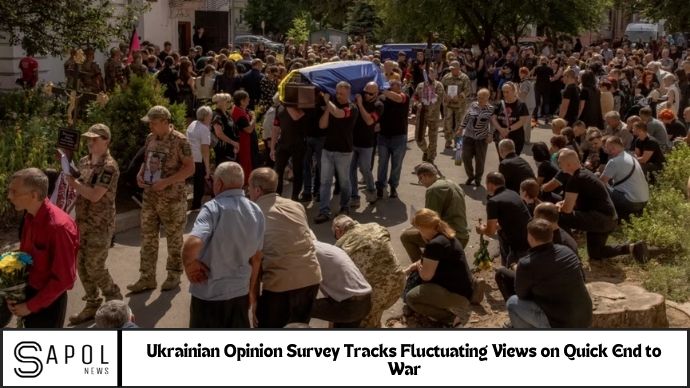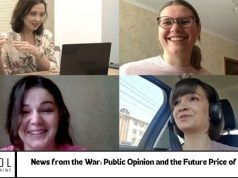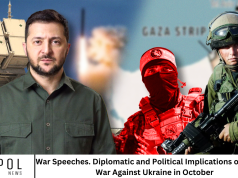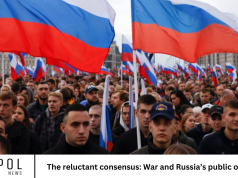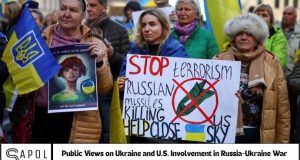Ukrainian Opinion Survey Tracks Fluctuating Views on Quick End to War A recent public opinion survey in Ukraine reveals a significant shift, with a slight majority of Ukrainians now saying they would be willing to concede territory in exchange for peace. However, other recent polls suggest that the issue is far more complex.
The Gallup poll, conducted in August and October, shows that 52% of Ukrainians favor negotiating a quick end to the war, while 38% want to continue fighting until victory is achieved. While some media outlets have framed this as a shift in public sentiment since the war’s early days, other surveys suggest that support for a swift resolution is not as widespread.
For example, a survey conducted by the International Republican Institute’s (IRI) Center for Insights in Survey Research (CISR) in September and October found that strong majorities of Ukrainians remain confident about the country’s ability to defeat Russia. The survey also found that Ukrainians overwhelmingly support recapturing all lost territories.
According to this survey, released on November 12 and based on interviews conducted in Kyiv-controlled areas in late September and early October, 88% of Ukrainians are optimistic about Ukraine’s chances of winning the war. Although this figure is lower than the 98% who believed in victory in June 2022, it has remained steady since February 2024.
Ukrainian polling organizations have echoed similar findings. A study from the Kyiv International Institute of Sociology (KIIS) in September-October 2024 reported that 81% of Ukrainians believe victory is possible, provided the West continues to offer support. Only 14% view Russia as too strong, up from 7% in December 2023.
Furthermore, a national survey from the Ilko Kucheriv Foundation “Democratic Initiatives,” in collaboration with the Razumkov Center, found that Ukrainians are largely opposed to surrendering territory to Russia. Only 9% of Ukrainians said they would accept recognizing occupied territories as part of Russia in exchange for peace, an increase from 5% in August 2023. On the other hand, 81% still consider such a concession unacceptable, though this number has decreased from 90% in August 2023.
Pollsters attribute the differences in the findings to variations in survey methodologies.
Key Findings from the Survey:
A recent survey conducted by independent polling agencies has provided important insights into how Ukrainian citizens feel about the ongoing conflict. According to the results, there is a notable fluctuation in the desire for an immediate end to the war, influenced by various political, economic, and emotional factors.
Fluctuating Support for a Quick End: The percentage of Ukrainians supporting a swift conclusion to the war has varied over time. In the early stages of the conflict, there was a broad consensus in favor of a quick resolution to end the suffering. However, as the war has dragged on, opinions have become more divided. Some Ukrainians argue for a quicker peace deal to mitigate civilian losses, while others advocate for the continuation of the fight to reclaim occupied territories.
Influence of Military Success: As the Ukrainian military has gained ground in certain regions, public opinion has shifted toward a longer-term commitment to securing victory. In fact, a recent poll found that 45% of Ukrainians now prioritize reclaiming all occupied territories over an immediate peace agreement.
Economic Impact: The economic toll of the war is also a key factor. While the Ukrainian economy has shown resilience, the ongoing conflict has led to inflation, job losses, and financial instability. In some regions, economic hardship has fueled a desire for a faster resolution to restore normalcy.
Factors Influencing Public Opinion:
Several key factors play a role in shaping the fluctuating opinions of the Ukrainian population:
War Fatigue: The psychological and emotional toll on the population has contributed to a growing desire for peace, particularly among families who have lost loved ones or suffered from displacement.
International Support: The level of foreign aid and support from Western nations, such as the U.S. and European Union, has influenced public sentiment. Increased military and financial assistance has emboldened citizens to continue the fight.
Regional Divisions: Opinions on the war vary significantly by region. Eastern Ukraine, which has seen the most destruction, tends to have a higher percentage of people favoring a swift end to the conflict. In contrast, western regions, where anti-Russian sentiment is stronger, show greater support for continued resistance.
The Public’s Struggle Between Peace and Persistence: Ukrainians face a difficult choice between peace and perseverance. On one hand, the horrors of war — including civilian casualties, infrastructural damage, and displacement — push many towards supporting a peaceful resolution. On the other hand, the sense of national pride and the desire for justice compel others to fight on until all Ukrainian land is restored.
Recent Trends in Ukrainian Opinion: Data from recent months indicates that the public’s opinion is fluid and often changes in response to significant military developments. The government’s military achievements on the frontlines have reinforced public support for continued resistance, yet the emotional cost of war keeps the debate on a swift end alive.
Key Statistics:
- A 2024 survey showed that 52% of Ukrainians support continuing the war until all occupied territories are regained, while 39% favor a quicker peace agreement.
- Economic hardships linked to the conflict have been a major driver in changing opinions, with 63% of Ukrainians expressing concern about inflation and unemployment.
Conclusion:
The fluctuating public opinion in Ukraine reflects the complexity of the war and the deep emotional, political, and economic struggles faced by the nation. As the situation evolves, it is clear that Ukrainian citizens are caught between their desire for peace and their resolve to see the war through until a decisive victory. Understanding these shifting perspectives is essential for anyone analyzing the path toward a resolution and the future of Ukraine.
FAQs:
1. Why are Ukrainian opinions on ending the war so divided?
The division stems from the emotional cost of the war, economic challenges, and varying regional experiences with the conflict.
2. How has the war’s duration affected Ukrainian opinion?
As the war has stretched on, more Ukrainians support continuing the fight, particularly after military successes and external aid.
3. What role does international support play in Ukrainian opinions?
Western military and financial support boosts confidence in continuing the fight, affecting public sentiment.
4. What economic effects are influencing public opinion?
Inflation, unemployment, and financial instability have led some Ukrainians to favor a quicker peace settlement to end economic hardships.
5. How does regional sentiment differ in Ukraine?
Eastern Ukraine tends to favor a quick peace due to the direct impact of the war, while western regions lean more towards continued resistance.
6. Can Ukrainian opinion on the war change over time?
Yes, public opinion fluctuates in response to military developments, economic conditions, and political events.

